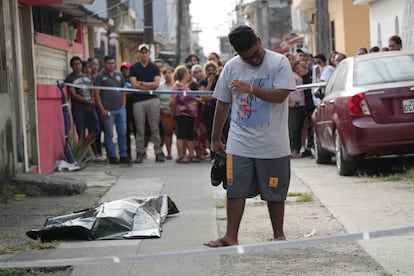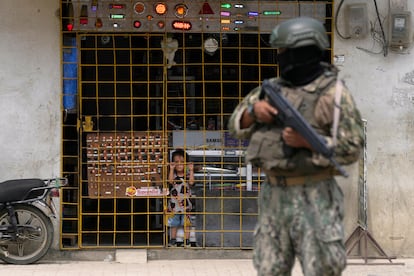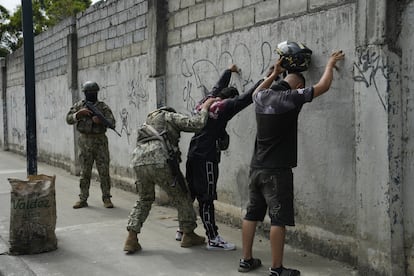Durán, the Ecuadorian city living under a reign of organized crime terror
The mayor of the coastal municipality does not stay in the same place for more than one night after an assassination attempt and authorities cannot safeguard the lives of schoolchildren amid a gang turf war

A five-year-old boy was doing his homework when bullets ripped through the window of his house and hit him; 90 shots were fired at the premises of a pharmaceutical company; a baby died in her mother’s arms when she was shot in the head; a school student was found with signs of torture in a ditch; a member of the municipal council, Bolívar Vera, was kidnapped and murdered. All of this occurred in just one week in Durán, a city on the Ecuadorian coast that is only separated from the country’s second-largest city and economic capital, Guayaquil, by a bridge and where criminal gangs have taken over from the rule of law.
The mayor of Durán, Luis Chonillo, has only been able to enter the city’s municipal building twice, and on neither occasion was he able to reach his office: he was evacuated due to threats from people on motorcycles surrounding the premises. On May 15, while the 220 mayors of Ecuador were celebrating their inaugurations and installing the first sessions of their municipal councils, Chonillo was fleeing a scene of an assassination attempt. The politician escaped unharmed, but two of his police security detail and a street vendor were killed in the attack. “All our officials have been threatened, they file complaints, but nothing gets done; they have not even been given security and many others have resigned,” says Chonillo, from a place of hiding. He has rarely appeared in public and when he does, it is with a bulletproof vest, a helmet and a group of policemen, which “is not enough for the level of risk I face,” he adds.

For security reasons, Chonillo does not stay in the same place for more than one night. He has had to leave the country; he constantly changes telephone numbers and to reach him it is necessary to go through several officials. He rarely gives interviews to the press because anything he says could put his life even more at risk. In four months of administration, the councilors of the municipality have not been able to meet in person. They hold debates by video conference, where they make decisions such as decreeing a state of emergency in Durán and demanding the national government intervene in a meaningful way, beyond the increased presence of police and military personnel as was the case when President Guillermo Lasso signed the most recent emergency decree on July 24.
Violence in Durán, a city of 315,000 inhabitants, began to spill over three years ago when a war broke out between criminal gangs for control of the territory, which is used as a staging point for drugs arriving from Colombia for distribution to Ecuador’s ports. Durán is surrounded by rivers through which large vessels sail in and out of the port of Guayaquil, Ecuador’s largest and where more than 50% of drugs destined for subsequent export are seized.
Monopoly of drug trafficking, extortion and kidnapping is disputed between two criminal organizations — the Chone Killers and Latin Kings — and in some sectors there are others such as Las Águilas, which operates in an area known as Cerro Las Cabras. Some children cannot even go to school there because of the dangers of being attacked by the opposing gangs. The criminals have created strongholds by delimiting the borders of the neighborhoods: they kill anyone who dares to enter. Via videos on social networks, the gangs boast of the control they exert over the streets, of the weapons they possess, and of training children and adolescents to turn them into hitmen.

Durán has asked for concrete actions from the Lasso government, but there have been few results. “He has not made a real intervention; it is not only the public forces, the social axis also has to play a part,” says Chonillo, who has requested a greater presence from government departments in the neighborhoods. He admits that projects in the city become stalled due to bureaucracy and violence. Works come to a standstill because contractors face extortion and demands for unpayable protection money. Criminal groups control everything, even the most precious resource, water, which is scarce in Durán. Less than 40% of the population receives piped drinking water, and the operators of the distribution valves are often kidnapped. “They steal from them, they beat them, sometimes they keep them tied up so that they have control of the valves,” says the mayor. “The municipal government is the primary authority within the city and should have the guarantees of [the system’s] proper functioning, and it does not have them.”
Durán was born as a city 37 years when it was declared a canton by presidential decree, but it features in the country’s history books because the final section of the national railroad was built there in 1892, linking the highlands with the Ecuadorian coast. However, the El Niño phenomenon destroyed several sections of track and with it ended Durán’s dream of being a city where commerce and tourism would converge. Even so, it managed to become a center of industrial development due to its proximity to Guayaquil. But the administrations were unable to tap that potential and, like most of the country’s towns and cities, Durán grew in a disorderly manner, with irregular settlements and lacking basic services: 67% of its population lives below the poverty line. “That disorder and chaos has provided a breeding ground for criminal organizations,” says Chonillo, who has asked the government to return to online classes as during the pandemic because no one can safeguard the lives of schoolchildren in Durán. Lasso’s administration has not yet responded to the request.
Sign up for our weekly newsletter to get more English-language news coverage from EL PAÍS USA Edition
Tu suscripción se está usando en otro dispositivo
¿Quieres añadir otro usuario a tu suscripción?
Si continúas leyendo en este dispositivo, no se podrá leer en el otro.
FlechaTu suscripción se está usando en otro dispositivo y solo puedes acceder a EL PAÍS desde un dispositivo a la vez.
Si quieres compartir tu cuenta, cambia tu suscripción a la modalidad Premium, así podrás añadir otro usuario. Cada uno accederá con su propia cuenta de email, lo que os permitirá personalizar vuestra experiencia en EL PAÍS.
¿Tienes una suscripción de empresa? Accede aquí para contratar más cuentas.
En el caso de no saber quién está usando tu cuenta, te recomendamos cambiar tu contraseña aquí.
Si decides continuar compartiendo tu cuenta, este mensaje se mostrará en tu dispositivo y en el de la otra persona que está usando tu cuenta de forma indefinida, afectando a tu experiencia de lectura. Puedes consultar aquí los términos y condiciones de la suscripción digital.








































